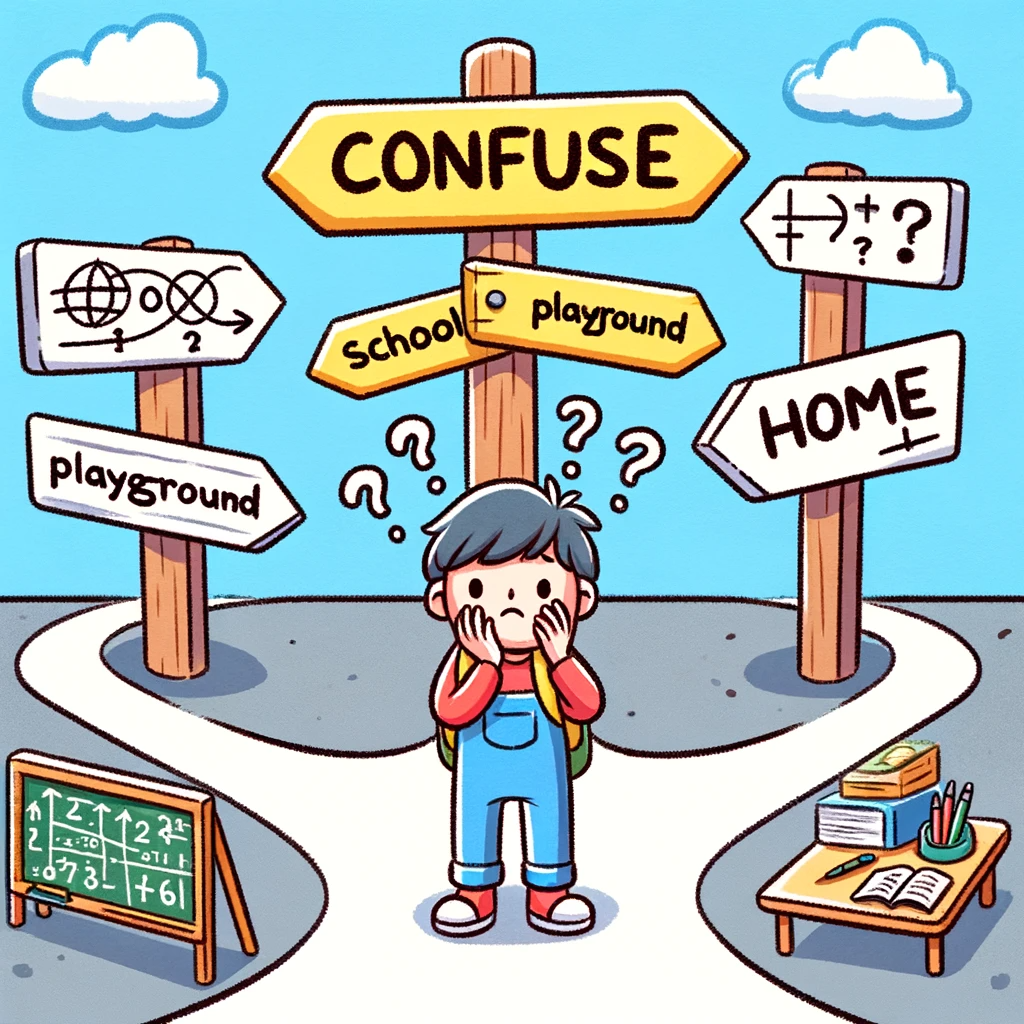Confuse
Definition
Confuse is a verb. It means to make someone uncertain or unclear in thought, to mix up or make things difficult to distinguish, or to make a situation more complex.
Parts of Speech
- Verb
Pronunciation
American English
- IPA Pronunciation: /kənˈfjuːz/
- Respelling: kuhn-FYOOZ
British English
- IPA Pronunciation: /kənˈfjuːz/
- Respelling: kuhn-FYOOZ
Etymology
The word "confuse" originates from the Latin "confundere," meaning "to pour together" or "mingle," from "con-" (together) and "fundere" (to pour). The term entered Middle English through Old French as "confuser," evolving in English to mean "to mix up" or "to bewilder."
Derivatives
- Confusion (noun)
- Confused (adjective)
- Confusing (adjective)
- Confusingly (adverb)
- Confusable (adjective)
Synonyms
- Bewilder
- Perplex
- Puzzle
Antonyms
- Clarify
- Explain
- Illuminate
Usage
The term "confuse" is often used when someone is made uncertain or things are made unclear. For example, "The instructions confused the students," or "The similar packaging can confuse customers."
Related Terms
- Misunderstand: To interpret incorrectly.
- Complicate: To make something more difficult or complex.
- Clarify: To make something easier to understand.
Detailed Definitions
Verb
- To make someone uncertain or unclear in thought: To cause someone to feel unsure or to misunderstand something.
- Example: "The sudden change in schedule may confuse some employees."
- To mix up or make things difficult to distinguish: Refers to causing things to become jumbled or unclear in comparison.
- Example: "The twins’ similar appearance can confuse their teachers."
- To complicate a situation or make it more complex: Used to describe making an issue or event more difficult to understand or manage.
- Example: "Adding unnecessary details might confuse the main point."
confuse



🇨🇳 Mandarin
- 混淆 (mix up)
- IPA Pronunciation: /xwən˥ ɕjaʊ̯˥˩/
- Respelling in English: hùnxiáo
- 困惑 (bewilder)
- IPA Pronunciation: /kʰwən˨˩˦ xwɔ˨˩˦/
- Respelling in English: kùnhuò
🇮🇳 Hindi
- गड़बड़ करना (mix up)
- IPA Pronunciation: /ɡəɽ.bəɽ kəɾ.naː/
- Respelling in English: garbar karna
- उलझाना (bewilder)
- IPA Pronunciation: /ʊl.d͡ʒʱaː.naː/
- Respelling in English: uljhānā
🇪🇸 Spanish
- Confundir (mix up/bewilder)
- IPA Pronunciation: /konˈfundir/
- Respelling in English: confundir
🇫🇷 French
- Confondre (mix up)
- IPA Pronunciation: /kɔ̃.fɔ̃dʁ/
- Respelling in English: confondre
- Désorienter (bewilder)
- IPA Pronunciation: /de.zɔ.ʁjɑ̃.te/
- Respelling in English: désorienter
🇸🇦 Modern Standard Arabic
- خلط (mix up)
- IPA Pronunciation: /xalat̪a/
- Respelling in English: khalt
- البلبلة (bewilder)
- IPA Pronunciation: /al.bil.bilah/
- Respelling in English: albilbilah
🇧🇩 Bengali
- ভুল ভাব (mix up)
- IPA Pronunciation: /bʱul bʱab/
- Respelling in English: bhul bhāb
- কিংকর্তব্য করা (bewilder)
- IPA Pronunciation: /kiŋkɔrtɔbbo kɔraː/
- Respelling in English: kingkôrtôbbo korā
🇷🇺 Russian
- Путать (mix up)
- IPA Pronunciation: /ˈputətʲ/
- Respelling in English: putat'
- Запутывать (bewilder)
- IPA Pronunciation: /zəˈputɨvətʲ/
- Respelling in English: zaputyvat'
🇵🇹 Portuguese
- Confundir (mix up/bewilder)
- IPA Pronunciation: /kõˈfũdʒiɾ/
- Respelling in English: confundir
🇮🇩 Indonesian
- Mengacaukan (mix up)
- IPA Pronunciation: /məŋ.a.t͡ʃau̯.kan/
- Respelling in English: mengacaukan
- Membingungkan (bewilder)
- IPA Pronunciation: /məm.bi.ŋuŋ.kan/
- Respelling in English: membingungkan
🇩🇪 German
- Verwechseln (mix up)
- IPA Pronunciation: /fɛɐ̯ˈvɛk.səln/
- Respelling in English: verwechseln
- Verwirren (bewilder)
- IPA Pronunciation: /fɛɐ̯ˈvɪʁən/
- Respelling in English: verwirren
🇯🇵 Japanese
- 混同する (mix up)
- IPA Pronunciation: /kondoː suru/
- Respelling in English: kondō suru
- 当惑する (bewilder)
- IPA Pronunciation: /toːwaku suru/
- Respelling in English: tōwaku suru
🇻🇳 Vietnamese
- Nhầm lẫn (mix up)
- IPA Pronunciation: /ɲam˧˩ lən˧/
- Respelling in English: nhầm lẫn
- Lúng túng (bewilder)
- IPA Pronunciation: /luŋ˧ tuŋ˧˩/
- Respelling in English: lúng túng
🇰🇷 Korean
- 혼동하다 (mix up)
- IPA Pronunciation: /hon.doŋ.ha.da/
- Respelling in English: hondonghada
- 당황하다 (bewilder)
- IPA Pronunciation: /daŋ.hwaŋ.ha.da/
- Respelling in English: danghwanghada
🇹🇷 Turkish
- Karıştırmak (mix up)
- IPA Pronunciation: /kaːɾɯʃˈtɯɾmak/
- Respelling in English: karıştırmak
- Şaşırtmak (bewilder)
- IPA Pronunciation: /ʃaːˈɯɾtmak/
- Respelling in English: şaşırtmak
🇵🇰 Urdu
- گھال میل کرنا (mix up)
- IPA Pronunciation: /ɡʱaːl meːl kəɾ.naː/
- Respelling in English: ghāl mēl karnā
- پریشان کرنا (bewilder)
- IPA Pronunciation: /pəˈreːʃaːn kəɾ.naː/
- Respelling in English: pareshān karnā





